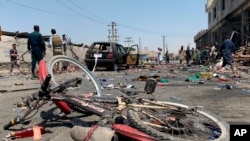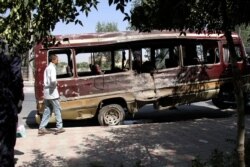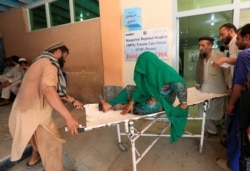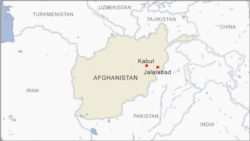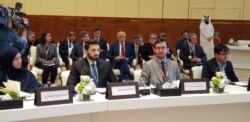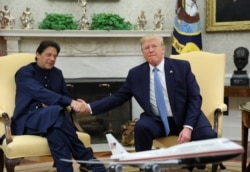This report was last updated on July 25, 2019 at 6:30 p.m.
ISLAMABAD - A series of attacks rocked Afghanistan Thursday, killing at least 58 people, including 38 members of Afghan security forces, as the chairman of the U.S. Joint Chiefs of Staff met with Afghan officials.
Three of those bombings targeted the capital, Kabul.
A ministry of interior spokesman, Nasrat Rahimi, said a suicide bomber on a motorcycle targeted a mini bus in Kabul carrying the staff of the Ministry of Mines and Petroleum as they were on their way to work Thursday morning. The blast killed at least 11 people. A secondary explosion rocked the site of the first attack.
Secondary explosions are common in Kabul and have in the past killed first responders and journalists covering the attack. A separate car bomb hit Jalalabad road in Kabul a few hours later. Local TV channels showed footage of relatives wailing outside local hospitals as they searched for their loved ones.
The local branch of the Islamic State terror group took responsibility for the two attacks on the minibus.
Meanwhile, the Taliban claimed responsibility for the third attack in Kabul in which they claim they targeted "foreign invaders."
"Martyrdom seeker [Muhammad Kabuli] using VBIED [ vehicle-borne improvised explosive device ] struck convoy of foreign invaders in Spechari area of #Kabul city 9am this morning resulting in 2 SUVs destroyed & 9 senior foreign officers killed," a Tweet from Mujahid said.
The blasts came as U.S. Joint Chiefs of Staff Marine General Joseph Dunford met with Afghan President Ashraf Ghani to discuss peace and stability in Afghanistan.
Later Thursday , the State Department said Ghani had spoken to Secretary of State Mike Pompeo the previous day. In the call, Pompeo told Ghani that Dunford and U.S. envoy for Afghanistan Zalmay Khalilzad had been sent to Kabul to "discuss in detail the next steps," toward peace and a "conditions-based" drawdown of foreign forces.
Separately elsewhere in the country, Taliban militants stormed security check posts in Takhar province while a bomb blast rocked Jalalabad in Nangarhar province.
Taliban spokesman Zabiullah Mujahid claimed that the militants ran over two bases in Ishkamesh district, killing and capturing security personnel and seizing their weapons and vehicles.
Two local provincial council members, Wafiullah Rahmani and Khalil Aseer, confirmed the Taliban attacks. Rahmani said the attacks killed 38 members of civil and national police.
Yet another blast in Jalalabad, the capital of Nangarhar province, killed nine members from the same family, six women and three children, according to Ataullah Khogyani, a spokesman for Nangarhar governor's office.
Gulzada Sangar, a spokesman for Nangarhar civilian hospital, said five other victims of the attack are in stable condition.
U.S. Ambassador to Afghanistan John Bass tweeted U.S. condemnation of the Kabul attacks.
"The perpetrators demonstrated a heinous disregard for the sanctity of human life, democratic values & #Afghanistan's future. The US stands with the people of Afghanistan in their aspiration for peace and a better future. #AfghanPeaceProcess," he tweeted.
Zalmay Khalilzad in Kabul
As the violence rages in Afghanistan, Zalmay Khalilzad, the man appointed by U.S. President Donald Trump to find a way to extricate the United States from Afghanistan, is in Kabul, discussing “where we are on the #AfghanPeaceProcess,” according to his tweets. He met senior Afghan leadership Wednesday, including President Ashraf Ghani, Chief Executive Abdullah Abdullah, and Foreign Minister Salahuddin Rabbani.
On Tuesday, as he arrived in Kabul, the Afghan government issued a strong press release demanding a “clarification” for President Trump’s words that "Afghanistan would be wiped off the face of the earth if he wanted to win the war but he did not want to “kill 10 million people."
Both Khalilzad and Taliban’s political team based in Doha have been sending out positive indicators about their ongoing negotiations, now in its seventh round.
Remaining issues
Both sides acknowledge that they have made progress on two issues: announcement of a timeline of withdrawal of U.S. forces from Afghanistan, and promises by the Taliban that Afghan soil will not be used for terrorism against any other country.
However, there seem to be differences on two more issues on the table: announcement of a comprehensive cease-fire and agreement by the Taliban to enter into direct negotiations with the Afghan government.
The United States has asked Pakistan to help use its influence with the Taliban to resolve these issues. Pakistan Prime Minister Imran Khan, who was on a three day trip to Washington and the White House this week, promised to help.
"Now, when I go back, after meeting President Trump, and I have also spoken to President Ghani, now I will meet the Taliban and tell them to talk to the Afghan government. I believe the election in Afghanistan should be inclusive and Taliban must be included," Khan said during a public talk at the United States Institute of Peace, a nonpartisan, U.S. government funded research organization.




